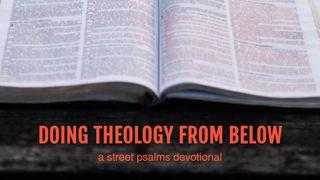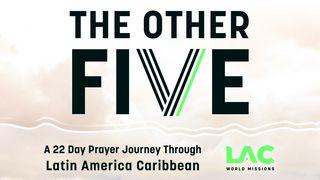8-Day Commentary Challenge - Romans 8Sample

Following the Promptings of the Spirit, 8:5–11
Paul now turns to explain this life lived according to the Spirit (vv. 5–14). The Spirit comes to us as a gift (not merited in any way) when we become Christians. Through this gift God’s love was poured out into the hearts of Christians (5:5). In 7:6 the Spirit is referred to as the agent of the new life. Jesus Christ is our justification and His character the goal of our sanctification; and it is the Holy Spirit who effects this moral transformation in us. The “Spirit of God” and “Spirit of Christ” appear to be identical terms (v. 9). Thus justification can never be separated from sanctification (Christlikeness). Both are inseparably linked to the grace-gift of God in Jesus Christ. Yet how does the Spirit in our experience effect sanctification?
First, the Holy Spirit produces in us a certain mindset (vv. 5–8): “those who live in accordance with the Spirit have their minds set on [Gk. phroneō, are intent on following] what the Spirit desires” (v. 5). It may be helpful to note that certain terms Paul uses here denote either different states of existence (Christian or non-Christian) or different patterns of behavior. To “live according to the flesh” is to be a non-Christian, under sin’s power (vv. 8–9); on the other hand, to “live in accordance with the Spirit” or “Christ . . . in you” is to be a Christian, under the Spirit’s power. To be “controlled by the sinful nature” (v. 9 amp) is equivalent to “live according to the flesh”; to “live in accordance with the Spirit” means that “by the Spirit you put to death the misdeeds of the body.” All of these terms mean to conduct our lives according to the standard, values, and resources of the life-giving Spirit within us (vv. 4–5, 13). The presence of the Holy Spirit redirects our life toward God and creates in us new desires and values. To have the “mind governed by” the things of the flesh or Spirit means to have one’s thoughts, desires, and constant yearning directed toward either the life of the flesh (self ) or the life of the Spirit (Christ). In this struggle we either take the side of the flesh or take the side of the Spirit.
The results follow (v. 6). To have one’s mind directed only upon the things of self and this material world means cutting oneself off from the only Source of true human life and results in death now in this life (condemnation and evil) and eternal death to come. On the other hand, to have one’s mind directed upon God through the Spirit results in “life” (acquittal and sanctification) and “peace,” the conscious enjoyment of reconciliation with God now in this life and at the final end when we stand before God.
Several years ago a pastor friend of mine moved to Houston, Texas. Some weeks after he arrived, he had occasion to ride the bus from his home to the downtown area. When he sat down, he discovered that the driver had accidentally given him ten cents too much change. As he considered what to do, there alternately appeared to his imagination little angelic figures sitting on his opposite shoulders and whispering instructions into his ears. One appeared and said, “You better give the dime back. It would be wrong to keep it. Christ wouldn’t keep it.” On the other shoulder a voice said, “Oh, forget it. It’s just ten cents. Who would worry about this little amount? Anyway, the bus company already gets too much fare. With their millions every day they’ll never miss it. Accept it as a gift from God and keep quiet.” When his stop came up, he paused momentarily at the front door, and, handing the driver the dime he said, “Here. You accidentally gave me too much change.” The driver replied, “Aren’t you the new pastor in town? I have been thinking lately about going to church somewhere. I just wanted to see what you would do if I gave you ten cents too much change.” When my friend stepped off the bus he literally grabbed the nearest light pole, held on, and said, “O dear God, I almost sold Your Son for ten cents!”
Paul further describes the mind directed toward the flesh (non-Christian) in its relationship to God (vv. 7–8). The flesh’s interests are such that those who live to please themselves are in fact in a state of hostility against God. Such hostility is evident because the mind directed by the sinful flesh does not and cannot become obedient to the law (will) of God (7:14–25). It follows that such who live to please themselves cannot live to please God. The opposite would be true of those who have been put by grace into the mind directed by the Spirit: Instead of disobedience to the law (will) of God, they respond with loving obedience; in place of walking apart from God, they walk with God.
In verses 9–11 Paul contrasts the state of the Christian (“controlled by the Spirit,” 8:9) with the preceding description of those “controlled by the sinful nature” (vv. 7–8 amp). In verse 9, “you, however,” the “you” is emphatic: “but as for you.” Paul clearly teaches in verse 9 that all Christians are “controlled by the Spirit”, which means that “the Spirit of God lives in” every Christian. In fact, he says, “If anyone does not have the Spirit of Christ, they do not belong to Christ” (as a justified one). To be “in Christ” or “in the Spirit” refers to our union with Christ; to have Christ in us (v. 10) or the Spirit in us (v. 4) refers to our ownership by Christ. The Spirit “lives” (Gk. oikeō, to live in a house) in us in the sense of a person making his home in our lives. The figure of indwelling combines the thought that Christians are people whose lives are directed from a Source outside themselves with the idea that this life Source is also vitally related to them. Three times in verses 9–11 this indwelling of the Spirit is stressed. “Paul’s thought is that through the indwelling of the Spirit Christ Himself is present to us, the indwelling of the Spirit being ‘the manner of Christ’s dwelling in us’” (Calvin as cited by Cranfield, Romans, 1:389).
What are the effects in our experience of this indwelling Spirit of God? Paul states that, even though the body is dead because of sin, the spirit “is alive because of righteousness” (v. 10). What he teaches is a modified dualism in Christian experience. At the present time a dual principle operates in Christians. On the one hand, they still possess a physical body condemned to death because of Adam’s sin (5:15; 6:23). The seed of decay and death is now working in our bodies. Yet for Christians another reality is now at work. Life is also present due to the indwelling of the Spirit given to us through justification. The Spirit enables us to “live” in spite of the fact that the body has been stricken with a death wound (8:13). Christians then, while still in the weak, sinful flesh, have been released from its power; while still in the body, which has received a mortal wound from sin, they have a new principle of life working in it through the righteousness of God in Christ. The Christian is totally dead on the one hand, yet fully alive on the other. Such a truth will spare us from either expecting absolute perfection in this life or giving in to complete pessimism concerning the present manifestation of Christ’s love and righteousness in our lives. Moral transformation is a present reality in our lives because of the Spirit’s work.
Furthermore, the presence of the same Spirit, who gives life now to believers living in decaying bodies, also is the guarantee that our bodies, destined to physical death, will be raised from death in the same manner that Jesus’ body was raised (v. 11). The Father is the specific agent in resurrection as in the case of Christ (6:4), but as in Christ’s case, the Holy Spirit also is an agent (1:4). Later in the chapter Paul will refer to this future hope of resurrection as the “redemption of our bodies” (v. 23). Again we are reminded that just as human nature was not made for sin but the usurper illegally took it over (v. 3), so also the mortal body was not made for death and will be in God’s time, because of the Spirit of life, raised to immortal life (1 Cor. 15:51–53). This is no mere spiritual resurrection. What a glorious truth!
Scripture
About this Plan

This reading plan is from the Everyday Bible Commentary on Romans 8 and will help you dive deeper into Scripture. It is for anyone who has a desire to grow in their understanding of Scripture and strengthen your relationship with God by delving into this pivotal chapter of Romans.
More
We would like to thank Moody Publishers for providing this plan. For more information, please visit: https://www.moodypublishers.com/books/bible-study-and-reference/romans--everymans-bible-commentary/
Related Plans

Reading Galatians With Charles Spurgeon

HEBREWS AND I PETER Zúme Accountability Groups

ROMANS AND I TIMOTHY Zúme Accountability Groups

Doing Theology From Below

The Other Five Prayer Journey

The Bible | a 4-Day Skate Church Movement Devotional

Discipleship | a 5-Day Skate Church Movement Devotional

Faith Over Feelings

Even in the Shadows: Living With Depression
